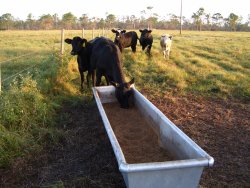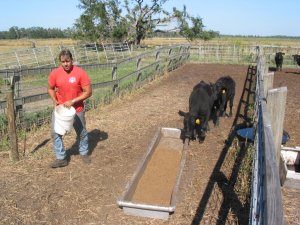Effects of supplementation frequency on performance and forage intake of yearling Brangus steers

Supplementation is required in most of Florida's cow-calf operations because the tropical perennial grasses grown in the state usually do not have adequate energy and protein content to meet the requirements of the cattle. The frequency at which supplements are offered depends on the supplement type and also on the management system of the operation. According to a review compiled by Dr. Kunkle and co-workers at the University of Florida - Gainesville, cattle supplemented daily, three times per week, or once a week have similar rates of body weight gain. However, the majority of the cited studies referred to protein or grain-based supplements, and none evaluated energy supplements based on low-starch by-products, such as citrus pulp. Citrus pulp originates from the citrus industry, an important and abundant agricultural enterprise in Florida. For that reason, citrus pulp is widely used as energy feed in beef cattle operations across the state.
As part of a nutrition study, we recently evaluated the effects of supplementation frequency on body weight gain and voluntary forage intake of steers (November to December, 2004). Sixteen Brangus steers, averaging 12 months of age and 565 lbs of body weight, were divided into two groups and fed citrus pulp + cottonseed meal supplements (60% TDN and 16% CP, as-fed basis) for six weeks. Both groups received the same amount of supplement in a weekly basis (41 lbs per head); however, one group received supplements daily, whereas the other group received supplements 3 times per week. During the experimental period, steers were maintained in feedlot pens, offered free-choice limpograss hay (47 % TDN and 7.8 % CP, as-fed basis), mineral, and water. Forage intake was determined daily and average daily gain was determined from body weights collected at the start and end of the study.

We observed that steers offered supplements daily tended to have greater body weight gain compared to steers offered supplements three times per week (0.66 vs. 0.40 lbs per day, respectively). To our knowledge, no other studies evaluating supplementation frequency with citrus pulp-based supplements have been reported to support our findings. Overall forage intake did not differ between the groups (1.36 and 1.29 % of body weight for steers fed daily and three times per week, respectively), but we observed that the daily forage intake was fairly constant for steers supplemented daily, but not for the steers supplemented three times per week, which consumed much less forage during supplementation days compared to non-supplementation days.
We concluded that feeding a citrus pulp-based supplement daily improved steer performance compared to the same supplement fed three times per week. We also observed that although no conclusive differences were observed in overall forage intake between groups, steers fed supplements every day had a less variation in daily forage intake compared to those fed supplements three times per week.

